Bees

Understanding the importance of bees
A single honey bee can visit over a hundred and sometimes up to a thousand flowers per day. They head out each day in search of nectar and pollen, all the while pollinating as they go. As we work in our gardens, enjoy our BBQs, walk through the park or pass a farm field, we most likely never even take notice of the hardest working creature alive. A large majority of the fruits and vegetables we eat require pollination. Bees, and specifically honey bees, are the world’s most important pollinators.
The bee’s economic contribution
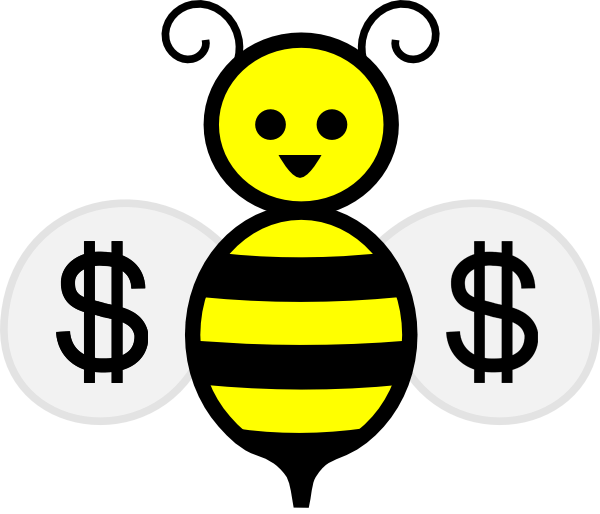
It is estimated that honey bees pollinate $30 billion worth of crops in the US and in the UK €200 million worth of crops. Even if the honey bees do not directly pollinate a crop, the crop still benefits indirectly from being in an environment in which honey bees are working. This is due to the increased biodiversity in the area, which stimulates the crop.
Almost 80% of US flowering crops depend on honey bees to survive. It is estimated that for every third bite of food we take each day, a honey bee has most likely pollinated it. Did we mention bees are important to humans?
But, there is a growing problem. One that is cause for great concern.
There has been a massive reduction in the honey bee population
Beekeepers report that they are losing, on average, 30% of all honey bee colonies each winter, twice the loss considered economically tolerable. Scientists are pointing to several causes including global warming, habitat loss and parasites among others. However, an even bigger threat is a class of bee-killing insecticides known as neonicotinoids.
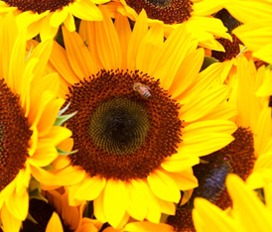
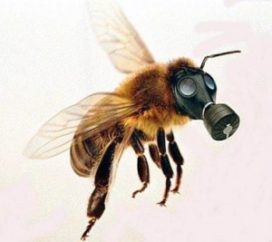
When seeds are treated with these neonics, the chemicals work their way into the pollen and nectar of the plants which makes them toxic for bees and other pollinators. Farmers and scientists are also working to reassess how we label agricultural chemicals and chemicals used in-home gardens in an effort to correct the issue.
Scientists are feverishly working to find the reason for the so-called Colony Collapse Disorder (CCD) that has wiped out an estimated 10 million beehives. Bee populations are so low in the US that it now takes 60% of the country’s surviving colonies just to pollinate one California crop, almonds. And that’s not just a west coast problem — California supplies 80% of the world’s almonds, a market worth $4 billion.
A world without honey bees would be devastating
It’s hard to imagine the enormity of what bees do for us. Not just for the crops we raise for food, clothing and livestock feed, but think about all of the wild fruits, nuts and so much more. Nature depends on these tiny buzzing beauties to keep the world in balance and they don’t stop there. Bees are the only insects that create food for human consumption. They truly are hard working creators.
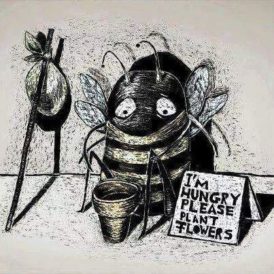
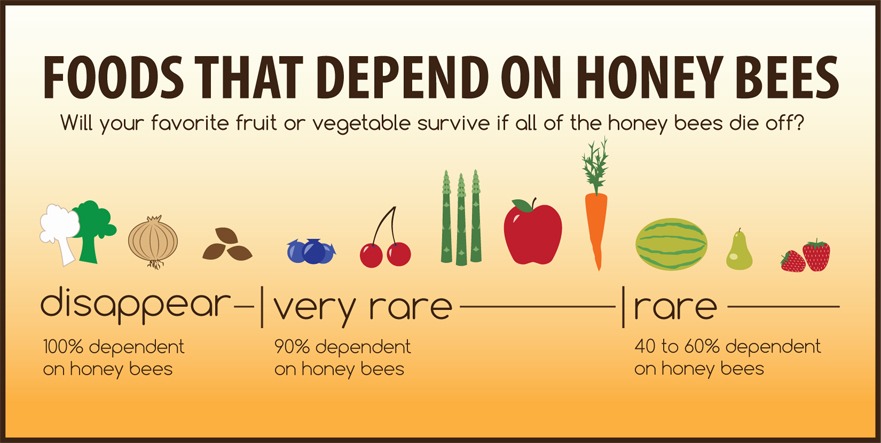
Just imagine if the honey bees went away. How would we be able to pollinate all the items needed, not just for humans but the all the world’s species? If we were to lose the honey bee every part of our ecosystem would be negatively affected and the effects would be devastating to this planet and mankind.
Here are just a few of the things we would lose without the amazing and wonderful bee!
| • avocados | • soybeans | • almonds | • asparagus | • broccoli |
| • celery | • squash | • sunflowers | • cucumbers | • citrus fruit |
| • peaches | • kiwis | • cherries | • cranberries | • melons |
| • tomatoes | • blueberries | • almonds | • cotton | • flax |
And there are also a number of valuable non-food products produced by the honey bee, such as beeswax used in cleaning and beauty products. That’s a lot to buzz about.
We can help!
Here are 5 ways we can give bees a chance
5 great tips on how to become bee conscious:
1. Eat more honey and buy it from a local beekeeper. There are several beekeepers that sell at the local Ventura County farmers’ markets. This is a pretty sweet way to help the bees. Local beekeepers tend to be more concerned about the health of their bees than they are about their profits. Other great benefits are that their products do not have to travel far to reach your kitchen.
2. Plant bee-friendly flowers. Bees love flowers, including: bee balm, borage, asters, lavender, thyme, mint, rosemary, honey suckle, poppies, sunflowers, marigolds, salvia, butterfly bush, clematis, echinacea blackberries, raspberries, strawberries, fennel, yellow hyssop, milkweed, goldenrod, and many more. They also like good weeds like dandelions and clover.
3. Read those Labels! Stop using commercial pesticides, herbicides and fertilizers – these chemicals are harmful to the bees. And they’re also harmful to you, your family, our soil and our water supply.
4. Beware of hidden killers. Some commercial compost contains imidacloprid, a deadly insecticide. It is highly toxic to all insects and all soil life, including earthworms.
5. Give them drinks on the house. Bees get thirsty too. Give them something to drink. You can provide water in a birdbath or shallow bowl; add a few pebbles so bees can easily climb in and out. Bees and butterflies love a mud puddle (they soak up valuable nutrients from the soil) so don’t worry if things get a bit muddy.
Image credits: Dan Hutcheson, Smudge9000, Sue Buenger, OCAL, Kat Merrick and others.



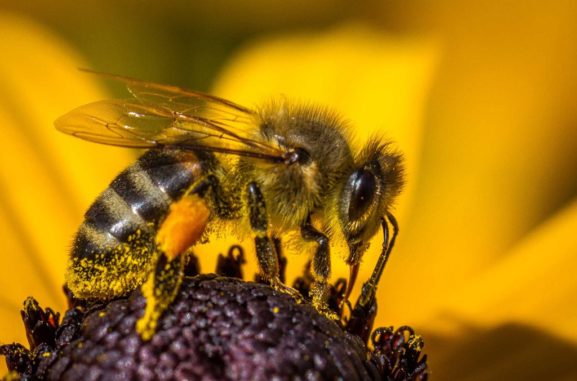

10 comments
Honey bees are lovely but they are non native and largely used for crops (not at all a bad thing). Our 1500 species of CA native bees are mostly solitary and are responsible for the majority of the wild pollination of our hillsides and gardens. All bees are good in my opinion, but I’d like to help raise the profile of our little golden neighbors. https://arboretum.ucdavis.edu/blog/beyond-honey-bee-learn-more-about-california-native-bees
Not me… I’m still terrified of bees
Love this! Love bees! Kat Merrick…with all your fab connections, can you organize a “beekeepers for a day” workshop/class? I believe OVI offers one. But, yours would be much more fun! PLEASE!!
Yes will work on setting that up.
Debbie Davidson Cvijanovich we have a bee keeper that keeps bees at the ranch so yes I am sure we could arrange a bee talk and day
Debbie Davidson Cvijanovich I wil work to set a talk up at the ranch … stay tuned!
I’m proud to announce I saved a bee’s life in the swimming pool last week. He was stranded on top of the water and I grabbed the skimmer and scooped him out. He flew off. Everyone can be a bee hero. ❤️
Well done!
So true!! Where were they this year? You think the fire threw everything off?? We have a huge crop for this next year, but sure didn’t see many bees, even put water out for them. Just everything’s different!
We have been seeing a lot coming back and each time I see them I cheer them on!